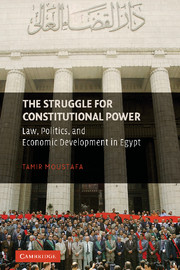Book contents
- Frontmatter
- Contents
- List of Figures and Tables
- Acknowledgments
- 1 Introduction: Law versus the State
- 2 The Politics of Domination: Law and Resistance in Authoritarian States
- 3 The Establishment of the Supreme Constitutional Court
- 4 The Emergence of Constitutional Power (1979–1990)
- 5 The Rapid Expansion of Constitutional Power (1991–1997)
- 6 Executive Retrenchment and an Uncertain Future (1998–2005)
- 7 Law, Development, and Democracy: A Critical Appraisal
- APPENDIX A SCC Justices and Commissioners
- APPENDIX B The Egyptian Constitution
- APPENDIX C Law 48 of 1979 Governing the Operations of the Supreme Constitutional Court of Egypt
- APPENDIX D Figures on Supreme Constitutional Court Rulings
- Bibliography
- Index
4 - The Emergence of Constitutional Power (1979–1990)
Published online by Cambridge University Press: 27 July 2009
- Frontmatter
- Contents
- List of Figures and Tables
- Acknowledgments
- 1 Introduction: Law versus the State
- 2 The Politics of Domination: Law and Resistance in Authoritarian States
- 3 The Establishment of the Supreme Constitutional Court
- 4 The Emergence of Constitutional Power (1979–1990)
- 5 The Rapid Expansion of Constitutional Power (1991–1997)
- 6 Executive Retrenchment and an Uncertain Future (1998–2005)
- 7 Law, Development, and Democracy: A Critical Appraisal
- APPENDIX A SCC Justices and Commissioners
- APPENDIX B The Egyptian Constitution
- APPENDIX C Law 48 of 1979 Governing the Operations of the Supreme Constitutional Court of Egypt
- APPENDIX D Figures on Supreme Constitutional Court Rulings
- Bibliography
- Index
Summary
When the Supreme Constitutional Court initiated operations in 1979, Egypt was in the midst of simultaneous economic and political transitions. On the political front, Sadat had engineered a fundamental reorganization of Egypt's political landscape as part and parcel of his reorientation away from the Soviet Union and his drive to entice foreign direct investment from the West. In 1976, Sadat introduced a tightly controlled process of political liberalization when he divided the Arab Socialist Union into three platforms, representing the left, right, and center of the political spectrum. One year later he issued a new political parties law that allowed for the establishment of political parties and governed competition among them. But Sadat's shift to a multiparty system was never intended to be a complete and comprehensive democratic transition. Rather, it was to be a tightly controlled process of political liberalization that would give the appearance of free party competition with few concrete concessions from the regime.
The legal framework was critical to this process of controlled liberalization. The new political parties law, in combination with an assortment of new legislation regulating political activity, established a tightly bounded corporatist political system with abundant levers for the regime to control nascent opposition parties. If there were any doubts about who was in control of the pace and extent of political reform, they were put to rest by Sadat's move to ban the New Wafd Party and to bar Wafd leader Fu‘ad Sirag al-Din and hundreds of others from political life when their criticism of the regime reached disagreeable levels.
- Type
- Chapter
- Information
- The Struggle for Constitutional PowerLaw, Politics, and Economic Development in Egypt, pp. 90 - 117Publisher: Cambridge University PressPrint publication year: 2007



